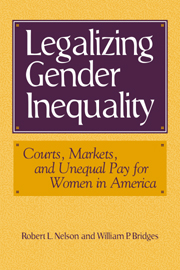Crossref Citations
This Book has been
cited by the following publications. This list is generated based on data provided by Crossref.
Reskin, Barbara F.
and
McBrier, Debra Branch
2000.
Why Not Ascription? Organizations’ Employment of Male and Female Managers.
American Sociological Review,
Vol. 65,
Issue. 2,
p.
210.
Wharton, Amy S.
2000.
Feminism at Work.
The ANNALS of the American Academy of Political and Social Science,
Vol. 571,
Issue. 1,
p.
167.
Thistle, Susan
2000.
The Trouble with Modernity: Gender and the Remaking of Social Theory.
Sociological Theory,
Vol. 18,
Issue. 2,
p.
275.
Reskin, Barbara F.
2000.
Getting it Right: Sex and Race Inequality in Work Organizations.
Annual Review of Sociology,
Vol. 26,
Issue. 1,
p.
707.
Reskin, Barbara F.
2001.
Sourcebook of Labor Markets.
p.
567.
England, Paula
Thompson, Jennifer
and
Aman, Carolyn
2001.
Sourcebook of Labor Markets.
p.
551.
Aiba, Keiko
and
Wharton, Amy S.
2001.
Job-Level Sex Composition and the Sex Pay Gap in a Large Japanese Firm.
Sociological Perspectives,
Vol. 44,
Issue. 1,
p.
67.
Huffman, Matt L.
and
Torres, Lisa
2001.
Job Search Methods: Consequences for Gender-Based Earnings Inequality.
Journal of Vocational Behavior,
Vol. 58,
Issue. 1,
p.
127.
Nelson, Robert L.
2001.
Law, Democracy, and Domination: Law and Society Research as Critical Scholarship.
Law & Society Review,
Vol. 35,
Issue. 1,
p.
33.
BALSER, DEBORAH B.
2002.
Agency in Organizational Inequality.
Work and Occupations,
Vol. 29,
Issue. 2,
p.
137.
Elvira, Marta M.
and
Graham, Mary E.
2002.
Not Just a Formality: Pay System Formalization and Sex-Related Earnings Effects.
Organization Science,
Vol. 13,
Issue. 6,
p.
601.
Kalleberg, Arne L.
and
Leicht, Kevin T.
2002.
Worlds of Work.
p.
87.
Nelson, Robert L.
and
Bridges, William P.
2002.
Handbook of Justice Research in Law.
p.
269.
Achatz, Juliane
Fuchs, Stefan
Stebut, Janina
and
Wimbauer, Christine
2002.
Organisationssoziologie.
p.
284.
Wharton, Amy S.
2002.
Organisationssoziologie.
p.
188.
Cohen, Philip N.
and
Huffman, Matt L.
2003.
Individuals, Jobs, and Labor Markets: The Devaluation of Women's Work.
American Sociological Review,
Vol. 68,
Issue. 3,
p.
443.
Kmec, Julie A.
2003.
Collecting and Using Employer-Worker Matched Data.
Sociological Focus,
Vol. 36,
Issue. 1,
p.
81.
Vallas, Steven P.
2003.
Rediscovering the Color Line within Work Organizations.
Work and Occupations,
Vol. 30,
Issue. 4,
p.
379.
BROOKS, BRADLEY
JARMAN, JENNIFER
and
BLACKBURN, ROBERT M.
2003.
Occupational Gender Segregation in Canada, 1981–1996: Overall, Vertical and Horizontal Segregation*.
Canadian Review of Sociology/Revue canadienne de sociologie,
Vol. 40,
Issue. 2,
p.
197.
Reskin, Barbara F.
2003.
Including Mechanisms in Our Models of Ascriptive Inequality.
American Sociological Review,
Vol. 68,
Issue. 1,
p.
1.



